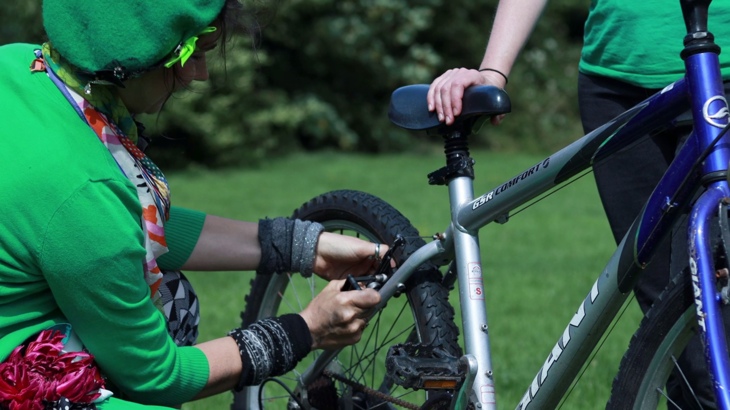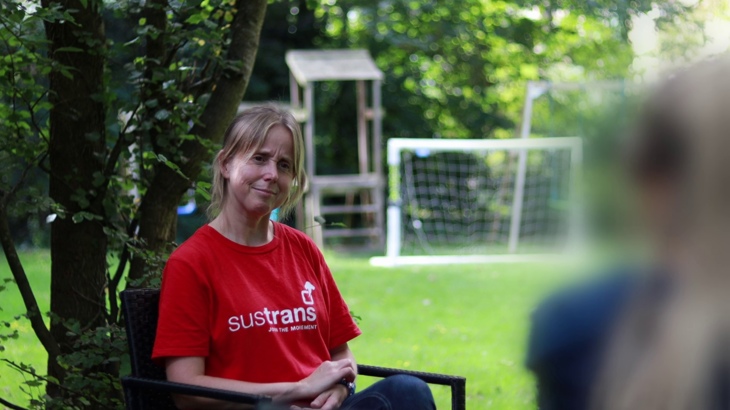Sustrans has teamed up with a refuge and local partners to provide access to bicycles and cycling sessions for women and children escaping domestic abuse.

As well as cycle sessions, Sustrans and volunteers have also provided bike maintenance at the refuge. Credit: Roxy van der Post
Access to bicycles, and the skills and knowledge to use them, enables the women and children to travel actively and be independent.
And thanks to bike donations from the local community and the time given by volunteers, this has all been free for the users of the refuge.
The project has become about much more than just cycling; it has become a tool for change.
Lucy, our Project Officer, said:
“I notice their whole body language change, they open up, they start talking. Especially the women, it reconnects them back to that joy of being a child, that fun, that freedom that they haven’t had for a long time.”
Supporting children to grow in confidence
For one boy aged 12 living in the refuge, it has been an amazing journey.
He was told by a doctor that he’d never be able to ride a bike, but just a few weeks after moving into the refuge, he was up and cycling.
He now rides his bike to school every day.
He attended weekly sessions with Lucy over 10 months and his confidence in all areas grew and grew.
Lucy explains:
“For the first few weeks he didn’t talk, but as he learnt how to ride and developed his skills, he started connecting and sharing his experiences.
“As his confidence grew, he started cycling every day with other children in the refuge and sharing what he was learning with them.”
The boy and his family have now left the refuge and went on their first six-mile family bike ride with Lucy.
Lucy will continue to work with them to support the boy riding to his new school and to build the mother’s confidence in riding with her children.
Learning to ride as an adult
A 44-year-old woman had a traumatic experience on a bike as a child and vowed to never get on a bike again.
However, the sessions provided by Sustrans and volunteers have helped her overcome this trauma, as she explains:
“I started off just scooting along with Lucy shouting encouragement - her enthusiasm and positivity is so infectious.
“I found that I really wanted to and could for the first time ever. So I went out daily with my children and with other residents encouraging me along the way, and was always excited to tell Lucy of my pursuits in trying to ride.
“I decided to take a leap of faith one day and put my foot on the pedals and I could ride! I'm not perfect, but I can put both feet on now and even turn corners!
“It feels like the first time in my life that I could just go for a nice ride with my children and do something together as a family.
“It brings us closer, especially when mummy almost falls off the bike - which I can actually laugh at and not feel ashamed!”

Through running the bike sessions, Project Officer Lucy has built relationships with the residents of the refuge. Credit: Roxy van der Post
Rediscovering a sense of freedom
For many residents, the safety of the refuge can be a comfort that is hard to separate from.
But as Project Coordinator at the refuge Kate Hall explains, the bike sessions with Sustrans have helped some of the women to find their freedom again:
“I've seen residents who didn’t want to leave the refuge environment [now] going on bike rides into the town centre and picking up the shopping.
“By engaging with the project, you see that they have an epiphany, a magic moment, when they see that they can actually do something new.”
An uncertain future for the project
The work by Sustans and volunteers has helped to rebuild lives and reestablish independence for people affected by domestic abuse.
However, funding for the project is set to end in December 2024, making it an uncertain future ahead.
It is hoped that new funders will be found to allow this invaluable work to continue.
If you’re interested in supporting this partnership, please consider donating as an individual, or get in touch on south@sustrans.org.uk.
Find out more about how corporate partners, trusts and foundations can help.





